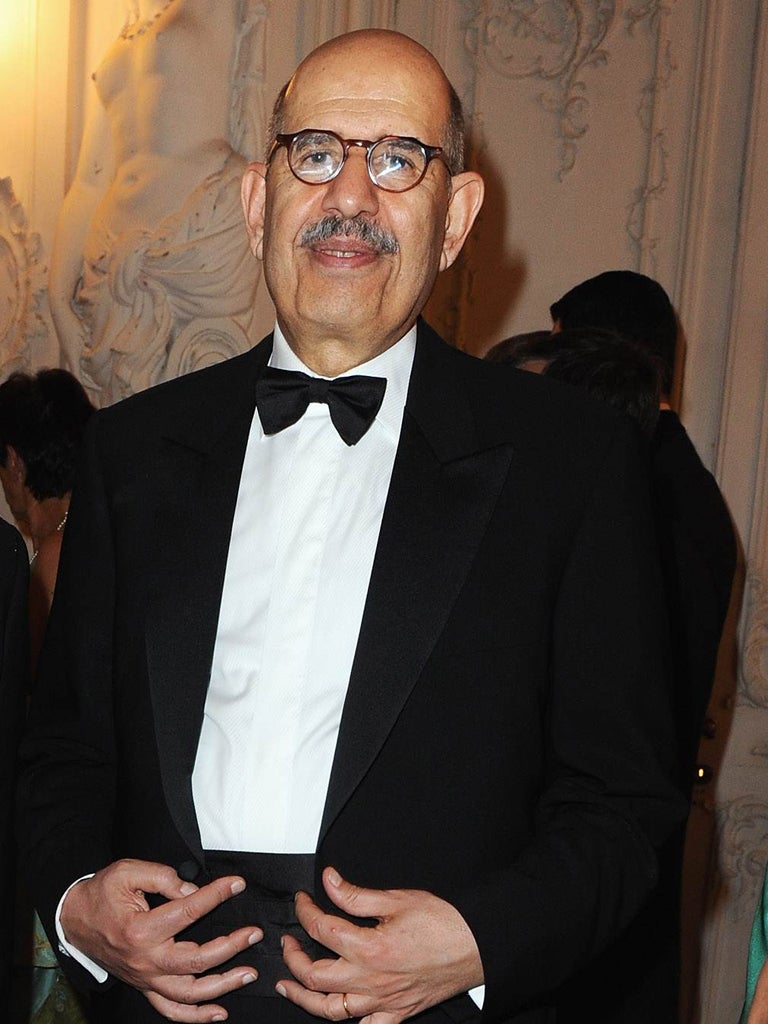Egypt's democracy is a sham, says ElBaradei, as he pulls out of election
Nobel laureate will not run for president

Your support helps us to tell the story
From reproductive rights to climate change to Big Tech, The Independent is on the ground when the story is developing. Whether it's investigating the financials of Elon Musk's pro-Trump PAC or producing our latest documentary, 'The A Word', which shines a light on the American women fighting for reproductive rights, we know how important it is to parse out the facts from the messaging.
At such a critical moment in US history, we need reporters on the ground. Your donation allows us to keep sending journalists to speak to both sides of the story.
The Independent is trusted by Americans across the entire political spectrum. And unlike many other quality news outlets, we choose not to lock Americans out of our reporting and analysis with paywalls. We believe quality journalism should be available to everyone, paid for by those who can afford it.
Your support makes all the difference.One of Egypt's leading voices for reform, Mohamed ElBaradei, said yesterday he is pulling out of the country's presidential race in protest at the military's failure to put the country on the path to democracy.
The 69-year-old Nobel laureate, who has been seen as a driving force behind the movement that forced the former president Hosni Mubarak to step down, said in a statement that conditions for a fair presidential election are not in place. He said the military rulers who took over from Mubarak have governed "as if no revolution took place".
His decision to pull out days before the first anniversary of the 25 January uprising reflects the dilemma in which Egypt's revolutionary movement finds itself – caught between a military that, it says, is trying to hold on to power, and a newly elected parliament dominated by the Islamist Muslim Brotherhood, which it fears will give the generals what they want.
The military rulers have said they will transfer power after presidential elections, to be held before the end of June. But many expect a fierce struggle over the military's future privileges.
"I reviewed the best ways to serve the goals of the revolution... and I found none within the official framework, including [running for] the presidency," Mr ElBaradei said. "I had said from the start that my conscience will not allow me to run for any official position unless there is a real democratic framework that upholds the essence of democracy and not only its form."
The Muslim Brotherhood, whose political party looks poised to take more than 40 per cent of seats in the next parliament, has also indicated that it may not field a candidate.
But the Brotherhood, by dominating parliament, is set to control the process by which a committee that will be entrusted with writing the new constitution is picked. Some liberals and youth groups fear this will produce a bargain in which the army continues to control executive power, but allows conservative Islamists to dictate the constitution.
Mr ElBaradei had argued that the constitution should be written before the elections. Many revolutionaries say that the first free vote after decades of dictatorship is unlikely to yield a representative parliament, and have advocated a constitutional committee made up of delegates of political parties, universities, unions and other institutions. Mr ElBaradei admitted the protest movement was in dire straits, but blamed its malaise on the military's failure to respond to its demands. He urged young people to continue their peaceful protests. "The youth are the ones who will rebuild this country... They are the dream, the hope," he said.
Many have criticised Mr ElBaradei's low profile since the revolution, saying he failed to act as the leader of an uprising that began without one but soon found it needed a figure to unify and guide it. His decision to stand down from elections, and not play the army's game, may restore some of his standing.
Ayman Nour, a presidential hopeful, supported Mr ElBaradei's decision, saying it was a "positive shock" to the nation and a new push for the revolutionary groups to demand more radical changes. The activist Omar Elhady wrote on his Twitter account: "ElBaradei's withdrawal proves he is a respectable man. I had stopped supporting him as president a while back. Now I see him as a national leader above official positions."
Join our commenting forum
Join thought-provoking conversations, follow other Independent readers and see their replies
Comments